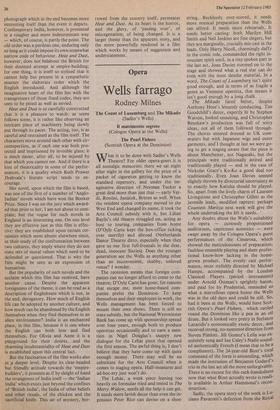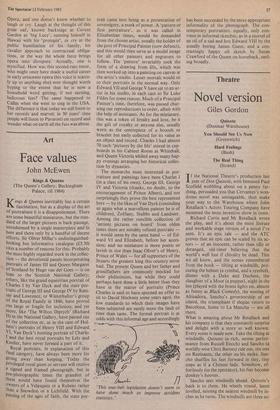Opera
Wells farrago
Rodney. Milnes
The Count of Luxemburg and The Mikado (Sadler's Wells)
The Pearl Fishers (Scottish Opera at the Dominion)
What is to be done with Sadler's Wells Theatre? For older opera-goers it is all nostalgic memories: there we sat night after night in the gallery for the price of a packet of cigarettes getting to know the standard repertory, and under the im- aginative direction of Norman Tucker a great deal more than just that — early Ver- di, Rossini, Jankek, Britten as well. When the resident opera company moved to the West End and changed its name, it took the Arts Council subsidy with it, but Lilian Baylis's old theatre struggled on, acting as host to touring companies from home (D'Oyly Carte kept the box-office ticking over merrily) and abroad (Netherlands Dance Theatre ditto, especially when they gave us our first full-frontals in the dear, dead, innocent Sixties). Does the younger generation see the Wells as anything other than an inconvenient, shabby, unloved venue? I wonder.
The recession means that foreign com- panies can no longer afford to come to the theatre; D'Oyly Carte has gone; for reasons that escape me, most home-based com- panies prefer the Dominion. To keep themselves and their employees in work, the Wells management has been forced to mount their own shows. There is still no state subsidy, but the National Westminster Bank has come up with sponsorship spread over four years, enough both to produce operettas occasionally and to earn a men- tion in Nigel Douglas's snappy new dialogue for the Lehar piece that opened the first season. The awful thing is, I don't believe that they have come up with quite enough money. There may well be no substitute for the Arts Council when it comes to staging opera. Half-measures and ad-hoc-ery just won't do.
The Lehar, a weak piece leaning too heavily on formulae tried and tested in The Merry Widow, needs all the help it can get. It needs more lavish decor than even the in- genious Peter Rice can devise on a shoe- string. Recklessly over-scored, it needs more musical preparation than the Wells can afford. It needs more rehearsals. It needs better casting: both Marilyn Hill Smith and Neil Jenkins are fine singers, but they are marginally, crucially mis-cast in the leads. Only Harry Nicoll, charmingly daffy in the comic role, commanded the right in- souciant spirit until, in a tiny spoken part in the last act, Joan Davies stormed on to the stage and showed what a real star can do even with the most slender material. In a word, The Count of Luxemburg isn't quite good enough, and in terms of as fragile a genre as Viennese operetta, that means it isn't good enough by a long chalk.
The Mikado fared better, despite Anthony Hose's leisurely conducting. Tim Goodchild's decor, expertly lit by Stephen Watson, looked smashing, and Christopher Renshaw's production was full of witty ideas, not all of them followed through. The chorus entered dressed as UK com- muters but with Japanese wigs and outer garments, and I thought at last we were go- ing to get a staging aware that the piece is about Manchester, not Nagasaki, but the principals were traditionally attired and traditionally played — and in the case of Nickolas Grace's Ko-Ko a good deal too traditionally. Even Joan Davies seemed slightly thrown by directorial uncertainty as to exactly how Katisha should be played. So, apart from the lively charm of Laureen Livingstone and Christopher Gillett as the juvenile leads, modified rapture: perhaps Countess Maritza next week will give the whole undertaking the lift it needs. '
Any doubts about the Wells's suitability for opera -- curiously proportioned auditorium, capricious acoustics — were swept away by the Cologne Opera's guest performances of the Cimarosa, which showed the meticulousness of preparation, faultless ensemble playing and sheer profes- sional know-how lacking in the home- grown product. The evenly cast perfor- mance, most stylishly directed by Michael Hampe, accompanied by the London Classical Players (period instruments) under Arnold Ostman's sprightly baton, and paid for by Prudential, reminded us what a marvellous opera house the Wells was in the old days and could be still. So, had it been at the Wells, would have Scot- tish Opera's Pearl Fishers, which rattled round the Dominion like a pea in an oil drum. But it looked very pretty in Stefanos Lazaridis's economically exotic decor, and received strong, no-nonsense direction from Steven Pimlott. Jill Gomez's Leila was ex- quisitely sung and Ian Caley's Nadir sound- ed authentically French (I mean that to be a compliment). The 24-year-old Bizet's total command of the form is astounding, which made the instrusion of Benjamin Godard's trio in the last act all the more unforgivable. There is no excuse for this cask-handedness now that what Bizet actually wrote is readi- ly available in Arthur Hammond's recon- struction.
Sadly, the opera story of the week is Lu- ciano Pavarotti's defection from the Royal
Opera, and one doesn't know whether to laugh or cry. Laugh at the thought of this great oaf, known backstage at Covent Garden as 'big Lucy', sunning himself in Hawaii with his 'protegee', or cry at the public humiliation of his family, his cavalier approach to contractual obliga- tions, or the way the whole farce brings opera into disrepute. Actually, one is mystified. How was this second-rate tenor, who might once have made a useful career in early ottocento opera (his voice is scarce- ly up to anything else) ever thought worth hyping to the extent that he is now a household word getting, if not earning, ludicrous fees? The same happened to Callas when she went to sing in the USA. The difference is that today we still listen to her records and marvel; in 30 years' time people will listen to Pavarotti on record and wonder what on earth all the fuss was about.







































 Previous page
Previous page